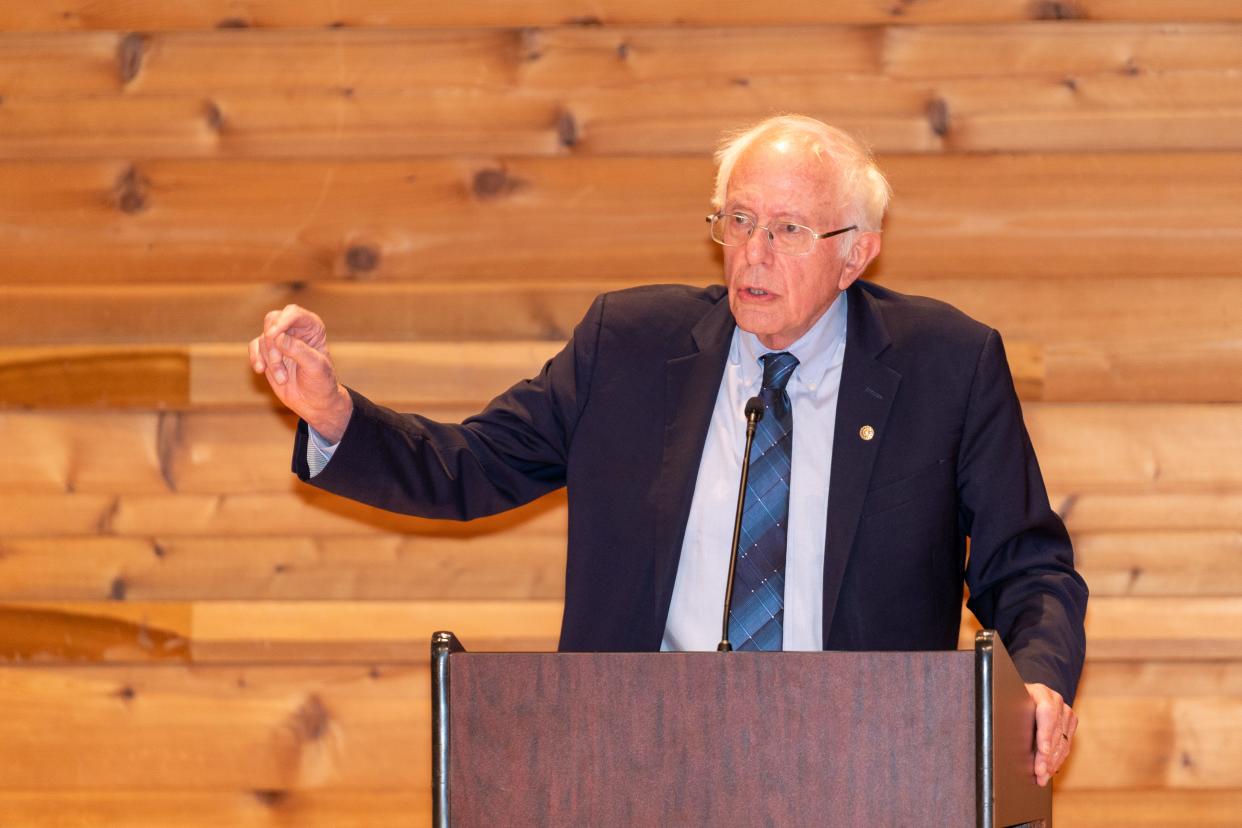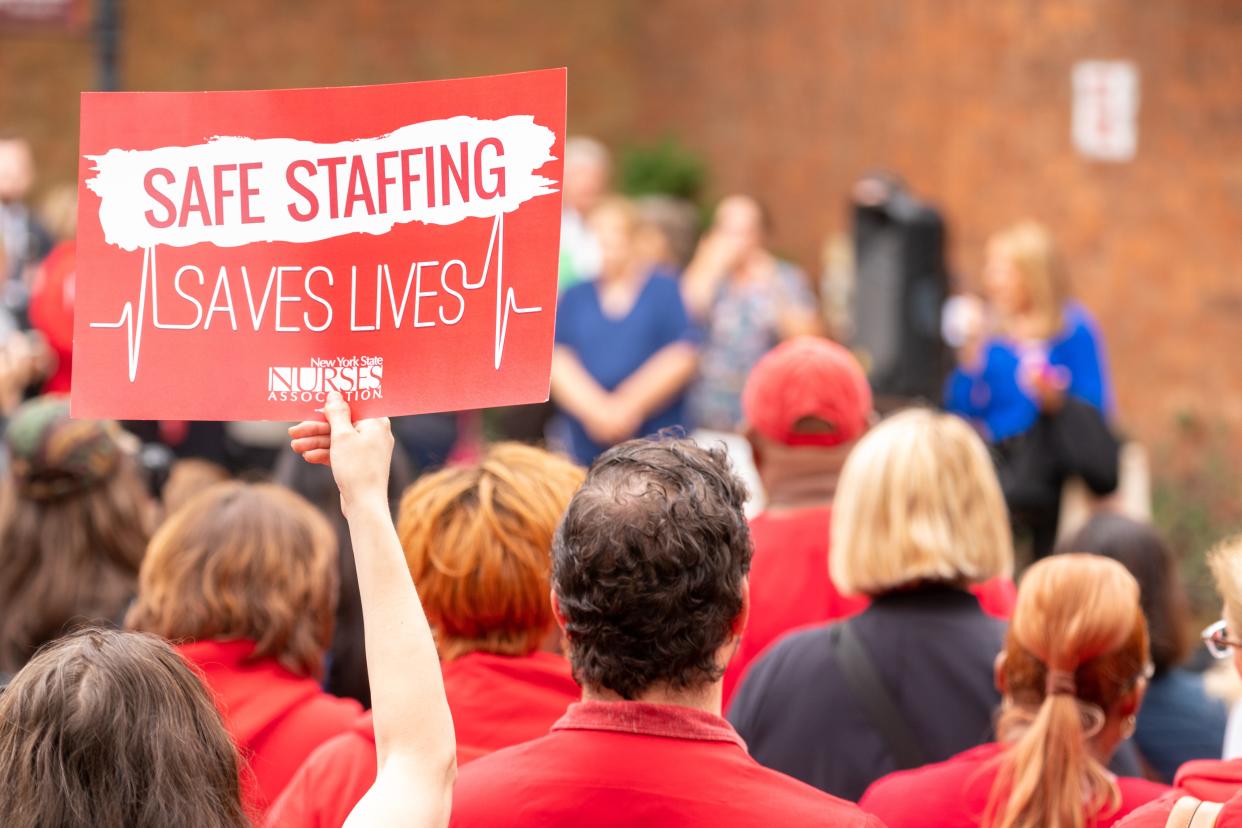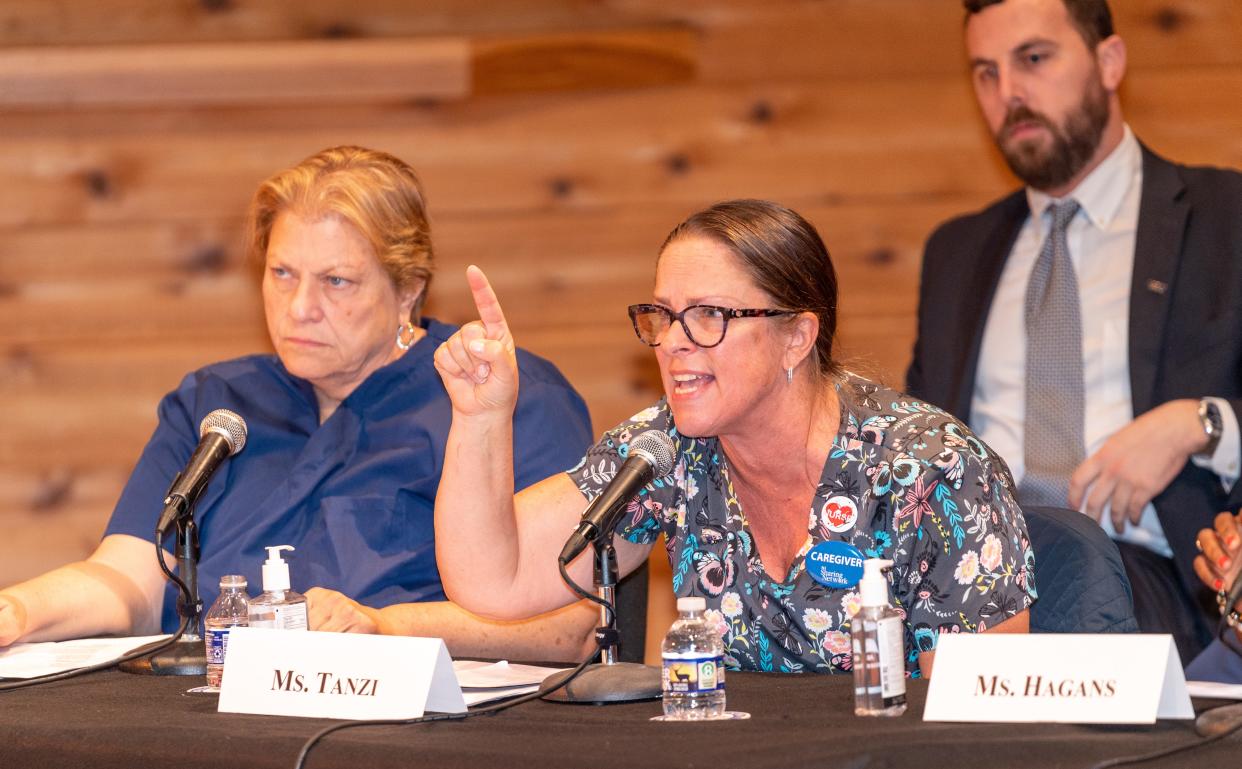Sen. Bernie Sanders injects himself into RWJ nurses strike with New Brunswick hearing
NEW BRUNSWICK – Sen. Bernie Sanders said he doesn't understand how the management of one of New Jersey's largest hospital systems says it wants to provide high-quality patient care, while having 1,700 nurses on strike.
"I would hope very much that the management of Robert Wood Johnson (University Hospital) comes back to the (negoatiating) table, they sit down and negotiate a reasonable contract which must include adequate patient-to-nurse ratios and instead of being at odds with the union, they work together to become a model for this country on what a good hospital should be," Sanders, I-Vt., said to conclude a 90-minute Senate Health, Education, Labor and Pensions (HELP) Committee field hearing Friday on the Rutgers University campus.
Sanders’ comments were met with applause from a capacity crowd of nurses from Robert Wood Johnson University Hospital, who have been on strike since Aug. 4, and their supporters. Sanders commended the nurses for standing up for themselves and their patients.
But even before the hearing, the hospital criticized the senator’s visit to New Brunswick.
"It's unconscionable that the senior Senator from Vermont overtly inserts himself into labor negotiations between a hospital in New Jersey and our nurses – and his public statements today illustrate that true intent. It’s clearly obvious now why not a single member of the Senate HELP Committee – Democrat or Republican – will join the senator at this taxpayer-funded press event," said Wendy Gottsegen, Robert Wood Johnson University Hospital spokesperson.

Despite Sanders’ appearance there is no indication the months-long labor dispute is closer to an agreement. While the hospital's negotiations team has met with the union six times since Oct. 6, no date has been set for the next negotiating session, according to the hospital.
Neither Mark Manigan, RWJBarnabas Health president and CEO, nor Alan Lee, Robert Wood Johnson University Hospital president, attended the hearing, but both provided written statements to the committee.
More: Kaiser strike settled: Health provider reaches labor pact with 85,000 workers after strike
"For months, we bargained in good faith with the United Steel Workers 4‐200 (USW 4‐200), who represent our nurses in New Brunswick, and I am happy to report, that while slower than I had hoped, we continue to make real progress in negotiations," Manigan said, adding he looks forward to continued progress at the bargaining table where negotiations belong.
"I am troubled by the inaccurate and misleading assertions put forth by the (Sen. Sanders) in recent public comments. Unlike a significant number of health care organizations in the Northeast and around the country, RWJUH has safe staffing guidelines in place that are derived from national, evidence‐based practice by peer academic medical centers. These guidelines were agreed to by the USW 4‐200 negotiating committee, representing RWJUH nurses, in multiple contract settlement offers from the hospital that they failed to ratify," Manigan said.

Lee said the hospital has negotiated in good faith and transparently and has offered more in settlement proposals than any other organization of similar scope has in its market.
"We have respected the nurses’ right to protest during this labor action despite relentless and abhorrent behavior impacting our sickest patients through noise and intimidation. Sadly, they went too far and assaulted a replacement nurse and began to intentionally block physicians reporting to the hospital to perform lifesaving interventions," Lee said. "Despite this behavior, which the union ultimately acknowledged was egregious and signed a consent order to cease and desist, we have kept our focus on settling our contract and delivering excellent patient care."
He added the hospital is committed to providing its nurses with fair and equitable compensation and ensuring safe staffing levels that meet criteria based on patients’ acuity and the volume of the patients treated.
The nurses cite safe staffing levels and removing any penalties for nurses who call out sick as the key issues to walking off the job. One nurse noted that when a hospital executive has a loved one admitted to the facility, that patient receives one-to-one nursing care.
During the hearing, one nurse described feeling anxious walking into work where her day involves juggling responsibilities such as giving medications, feeding and changing multiple patients, answering phone calls and patient questions and other duties, all without help. As a result, some things that need to be done, are not getting done, such as giving medications on time, she said.
More: Insurers often shortchange mental health care coverage, despite a federal law
"We try to help each other. Nurses have been afraid to talk. We don't want to alarm people," said Carol Tanzi, a Robert Wood Johnson University Hospital pediatric nurse.

Other nurses talked about new nurses crying in the bathroom because they are overwhelmed by the job responsibilities and lack of adequate staffing. Another nurse said she doesn't have enough time to eat or run to the bathroom because of the job demands.
Sanders said the nurses have been stretched to the breaking point, overworked and undervalued and forced to do more with less resources, noting the hospital has spent more than $100 million on replacement nurses.
Judy Danella, a 28-year nurse at the hospital and president of USW 4‐200, said union leaders have sat in negotiation rooms for hours and hours with no response from the hospital.
"It's a very simple concept, enforceable safe staffing, and we get told they will get back to us. Sunday night is now Friday, and they haven't gotten back to us yet," Danella said. "It's a very simple idea that has been complicated to the max. Enforceable safe staffing without sick-call penalties. We need to get a contract, we need to get to work, but first and foremost we need a response from the hospital."
U.S. Rep. Frank Pallone Jr., D-Long Branch, attended the hearing to support the nurses.
"We need to have federal and state legislation on minimum staffing ratios. If we don't have that there are always going to be problems because the patients need to be adequately taken care of. The other thing that's important is this strike needs to reach an agreement. I believe very strongly that we need to have these nurses back in the hospital," Pallone said.
Email: srussell@gannettnj.com
Suzanne Russell is a breaking news reporter for MyCentralJersey.com covering crime, courts and other mayhem. To get unlimited access, please subscribe or activate your digital account today.
This article originally appeared on MyCentralJersey.com: Sen. Bernie Sanders holds RWJ nurses strike field hearing at Rutgers
